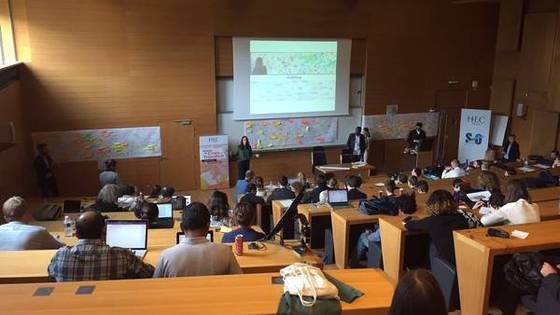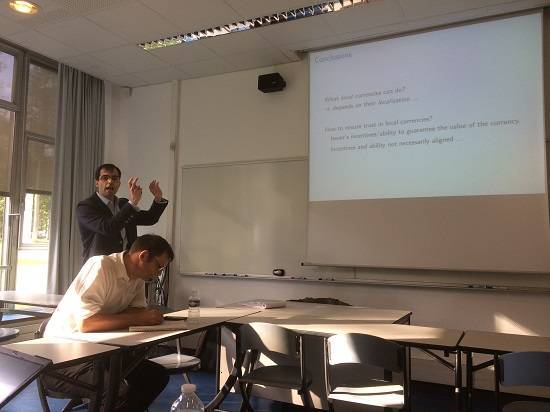Alliances for Cities in Transition Switch Gear
October’s annual SnO conference explored new alliances and city models aimed at carbon neutrality, inclusion and citizen empowerment. Speakers at the plenary session closing the event included community activist Rob Hopkins, Essonne’s Deputy Amélie de Montchalin and Bordeaux Mayor and former Prime Minister Alain Juppé. But this was the tip of an iceberg that featured intense workshops and international debates in a daylong event led by Julien Dossier, Lise Penillard and Benedicte Faivre-Tavignot.
(This article is an abridged version to be published shortly on the Knowledge website as well as in a special SnO magazine)

“The scientists are adamant: we only have a 5% chance of reaching our goal of limiting global temperature increase to 1.5°C before 2100!” There was no denying the sense of urgency in the message Rob Hopkins repeated again and again during his 12 hours of exchange with HEC students, staff members and guests from civil society and local government. “Time is running out,” the British activist insisted.
Over the course of an unusually warm autumnal day, this message was echoed by Julien Dossier, who has been teaching the Sustainable Cities course at HEC since 2010. The founder of Quattrolibri believes the hands-on approach to the October 19 conference is a “massive scale-up” from last year’s SnO conference. That 2016 Finance For Good Conference had explored the role of the financial sector in the current energy transition and the challenges of aligning financial incentives with inclusive growth. “This year, you could feel a heightened sense of concern about practical alliances, which were echoed by summits and debates well beyond our campus,” explained Dossier.
Can Les Mureaux Inspire the Rest of France?
The SnO conference focused on local communities and their quest to mobilize all actors of a zero carbon-imprint, sustainable and resilient habitat. Much of the day was devoted to practical roadmaps for small communities like Les Mureaux and Jouy-en-Josas, smart cities like Fort d’Issy, or larger conurbations such as Versailles and Luxembourg.
An actor of Les Mureaux’ development is Jean de Wailly (H96). The Global account executive at Sodexo Benefits and Rewards Services has spent the past year working with local associations and leaders to build a territorial pole for economic cooperation (PTCE). “There are over 100 nationalities represented in this community of 30,000 people. Their diversity opens up opportunities we aim to capitalize on. Sodexo, in association with the SnO’s Action Tank, is backing the PTCE because it federates a lot of creative energies into one geographical location.”

HEC Assistant Professor Eric Mengus leading a workshop on local currency in Les Mureaux with Rob Hopkins taking notes.
Seeking Practical Roadmaps to Sustainability
The day also featured the lively involvement of HEC students in debates on smart cities like Fort d’Issy and Luxembourg, and a workshop to design roadmaps “for 2°C cities”. In the latter, SASI student Sommia acknowledged the diversity of factors involved in creating sustainable communities: “I thought it only boiled down to urban planning,” the Canadian from Calgary said, “but I can see there are important components that inter-act.” He pointed to the elaborate network diagram designed by Julien Dossier, called “the post carbon fresco”. “That’s a great tool to guide your trail of thoughts, giving both the areas to focus on, and the wider picture.” Another student insisted on the “laboratory” that Les Mureaux is becoming for participative democracy. “The entire population is taking public decisions on all the key issues factoring into their daily lives,” he said. Such day-to-day democracy, he added, is essential in guaranteeing the development of such a culturally diverse community.
No Longer Drumming Alone in the Desert
“I’m encouraged by what I’ve seen grow here,” underlined Rob Hopkins. “HEC Paris is playing a very active and supportive role by using its connections to bring all the actors together.
For Julien Dossier, the day brought a positive energy he hopes will continue to grow. “It’s been very uplifting for people like us who have spent years on this work. I no longer feel like I’m drumming alone in a desert, there’s a collective effort and consciousness which is growing. But,” he cautioned, “HEC must look beyond the students from SASI, specialized Master or the SnO, all actively engaged in this field. In this transition we need experts in law, marketing, finance, human resources, and so on. They are all present at this school. My message to them is: ‘Let’s all work together, including our alumni network, to leave the business-as-usual mode.’ It’s about time we heeded the emergency and roll up our sleeves to design, implement and scale up climate compatible solutions.